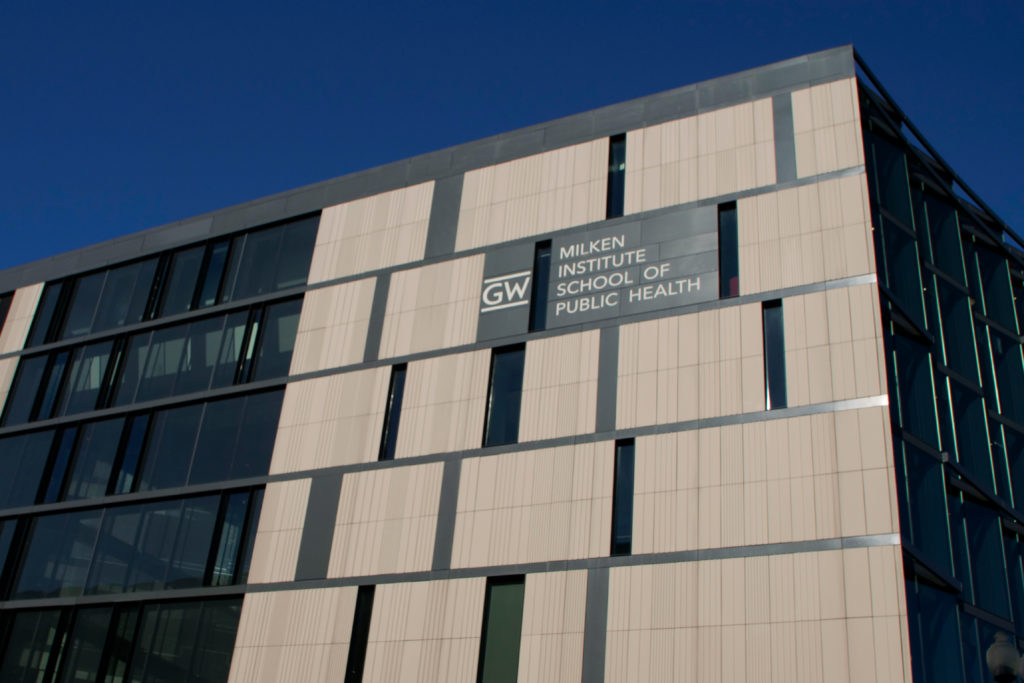Students said the pre-medical concentration launched last semester has helped them apply to medical school by providing them with advisers who can walk them through the application process.
Milken Institute School of Public Health officials said the concentration is beneficial for students applying for medical school, jobs and internships because they can note their pre-med concentration on their resume, demonstrating they have prepared academically for a medical career. Students said the concentration has allowed them to discern which classes will prepare them for their careers and connect with advisers who are familiar with the medical school application process.
Sara Wilensky, the public health school’s assistant dean for undergraduate education, said students have been “very positive about the change,” and more than 40 students have declared the concentration – 38 in public health and three in nutrition science – out of the roughly 500 undergraduate students currently in the school.
Students looking to declare a pre-med concentration can select the concentration within the public health major, according to the program’s website.
The public health school offers three undergraduate majors – exercise science, nutrition science and public health. Wilensky said the exercise science major already had a pre-med concentration to prepare students for medical school.
“This concentration combines the public health or nutrition science majors and the courses needed to matriculate at medical school,” she said in an email. “By doing so, it gives students a wide range of options, from pursuing any type of public health or nutrition science career to becoming a doctor.”
Students majoring in public health who declare the concentration are required to take classes like organic chemistry and general psychology in addition to their public health classes.
Wilensky said she hopes the concentration will also lead more students to consider a public health or nutrition science major.
“Having more of our providers understand how their care to individuals fits within the broader picture of helping our communities become healthier will be a benefit to everyone,” Wilensky said.
She said Milken officials plan to add a pre-health concentration to the public health major this fall, geared toward students interested in physical therapy, nursing, physician’s assistant work and dentistry.
“In terms of concentration elements, it is pretty straightforward because we relied on the advice from the pre-health advisers regarding which courses to include,” Wilensky said. “We will always look for ways to improve the overall experience of our pre-med concentration students, as well as all of our other GWPSH students.”
Isabella Atrachji, a senior majoring in public health who is pursuing the pre-med concentration, said some of the pre-med courses like chemistry and biology are “really hard” to learn online because they require “a lot of visualization.”
“It’s definitely changed my experience, and I am a big office hours girl, so I always took the time to go to office hours in person,” she said. “But now being online I don’t really go to office hours that often. I feel like the connection between me and my professors has been lost, which I’m sure a lot of students feel as well.”
Atrachji said she wishes more clinical classes were offered to students before the pandemic, like shadowing at the GW Hospital, since pre-med students need clinical hours to put on their medical school applications. But she said she is “really happy” that officials implemented the concentration despite the effects of the pandemic.
She said the concentration also allows her to more easily speak to advisers about medical schools’ application expectations.
“It’s really nice to see that Milken is recognizing that being pre-med isn’t just a list of classes to take, but it’s also a lifestyle and I think all pre-meds deserve recognition on their degree for all the hard work we’ve put in,” she said.
Calista Mueller, a sophomore majoring in public health who is also pursuing the concentration, said the program helps students decide which classes to take to help them with their medical school applications.
“I like that it shows the effort I put into those classes because those were just elective courses I was taking before it was considered a concentration,” she said.
Mueller said she also benefits from the additional advising because she has both a public health adviser and a pre-med adviser who help her plan out the two parts of her degree.
“When I’m planning out my courses, it’s a little bit easier to see how many credits I need exactly for each section of my degree,” Mueller said. “It just helps to map out my future semester plans better.”
Ana Campos, a senior majoring in exercise science who is also pursuing the pre-med concentration, said the concentration has provided her with “structure” for her time at GW. Milken officials create a four-year plan for students who declare the concentration to schedule when students should take the required classes for their major and the concentration to graduate on time.
But Campos said the concentration could be difficult for students who join later during their undergraduate career since many high-level classes have prerequisites or require students to have knowledge from lower-level courses.
“I feel like there should be a little more flexibility for people who are coming into the concentration as a sophomore and a little more reassurance that it’s going to be fine,” she said.








